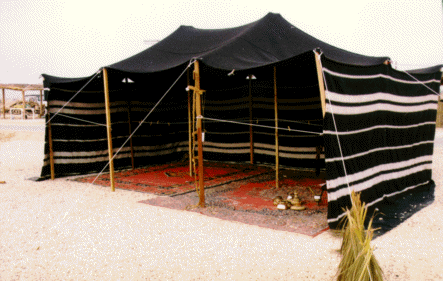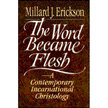Christ "Pitched His Tent" Among Us
In a pivotal verse of the Fourth Gospel's prologue, the Apostle John writes,"The Word  became flesh and lived for a while among us" (John 1:14 NIV). Lying behind the italicized words is the Greek verb skēnoō, one member of a whole group of words that share the root skēn- ("tent"). This root is the origin of our word 'scene'--the original scenery in plays was made of canvas, just like tents. The NIV translation attempts to convey the temporary nature of a tent dwelling by adding to 'lived' the phrase 'for a while.' But is transient the symbolism intended in this passage?
became flesh and lived for a while among us" (John 1:14 NIV). Lying behind the italicized words is the Greek verb skēnoō, one member of a whole group of words that share the root skēn- ("tent"). This root is the origin of our word 'scene'--the original scenery in plays was made of canvas, just like tents. The NIV translation attempts to convey the temporary nature of a tent dwelling by adding to 'lived' the phrase 'for a while.' But is transient the symbolism intended in this passage?
A couple of times in the New Testament, a skēn- word does have this transitory connotation. For evample, in 2 Cor. 5:1,4, Paul uses 'tent' (skēnos) to describe the mortal human body in contrast with the immortal resurrected body, which he calls a building. Likewise, Peter can refer to his own physical body as "this tent" (skēnōma, 2 Peter 1:13-14).
But at other times, the temporary aspect seems to be lacking. Besides John 1:14, all of the other occurrences of the verb skēnoō occur in the Book of Revelation, and those contexts can help us to clarify the meaning in John's prologue. Rev. 7:15 says that the martyrs serve God day and night in his sanctuary and that "he will spread his tent" over them. The significance is shelter, protection. Rev. 12:12 and 13:16 refer to those who "dwell" (literally "tent") in heaven. Rev. 21:3 once more refers to God, whose "tent is with people, and He will dwell with them."
Of all of these verses from the Apocalypse, we must ask whether their contexts indicate a temporary housing situation. The answer is consistently no. The shelter God gives to the martyrs is permanent (7:15). Those in heaven are there permanently (12:12 and 13:6), and Rev. 21:3 is referring to the permanent communion of God with His children, as confirmed in 22:5's "forever and ever."
The nouns in the skēn- word group sometimes lead us in the same direction, for Jesus counsels his hearers to "make friends for yourselves with unrighteous Mammon [money] so that when it is gone, they will receive you into the eternal dwellings (pl. of skēnē)." Impermanence is certainly not the point here. In Acts 7:46, Stephen speaks of David asking to find "a dwelling [literally, 'tent' skēnōma] for the God of Jacob." In the next verse, Stephen says Solomon was the one who built a house for Him. The context seems to make 'tent' and 'house' synonymous.
So what is the meaning of skēnoō in John 1:14? If impermanence is not the point, what is? Another possibility arises from the use of 'tent' in the Synoptic accounts of the transfiguration. Peter, seeing Jesus speaking with Moses and Elijah, offers to build three shelters (literally, 'tents'--pl. of skēnē) for them (Mark 9:5; Matt. 17:4; Luke 9:33). Peter's motivation seems to be the opposite of impermanence; he wants to prolong the meeting. His purpose was to facilitate the fellowship the three were having by giving all three of them some shelter from the elements.
This idea of sharing a common existence may be the point of John 1:14. All human beings among whom Jesus came have pitched their "tents," and Jesus did too. He came to be, not just among them, but also one of them.
Nor is this a temporary identification. His oneness with us, begun in the virginal conception, continues through all eternity. At the resurrection, He received a transformed, immortal, glorified body--His flesh became incorruptible, yes, but it was, and is, still flesh. Jesus became human, became one of us, and He remains human, remains one of us (2 Tim. 2:5--the man Jesus Christ is [present tense] mediator between God and humans; see also Phil. 3:21). It is a profound mystery, but one of the wonders of redemption.
Millard J. Erickson. The Word Became Flesh: A Contemporary Incarnational Christology (1991).
The church first answered conflicts over the deity and humanity of Christ at the Council of Chalcedon in 451. But Erickson finds Chalcedon's definition too narrow and negative a response to the "Christs" of liberation, feminism, blackness, functionalism, universalism, and postmodern theologies, among others. There must be a new Chalcedon - a doctrine that confesses what Jesus is not, but also affirms all that He is. The Word Became Flesh returns the theological discussion to what Christ said about himself and what Scripture deems important to stress. Erickson is a research professor of theology at Southwestern Baptist Theological Seminary. His Ph.D. is from Northwestern University, with postdoctoral studies at the University of Munich.
Recommended for online reading:
Wayne A. Grudem. "Jesus Will Be a Man Forever," 542-543 in his Systematic Theology: An Introduction to Biblical Doctrine (1994).
Steve Singleton, DeeperStudy.com

» Post a Comment